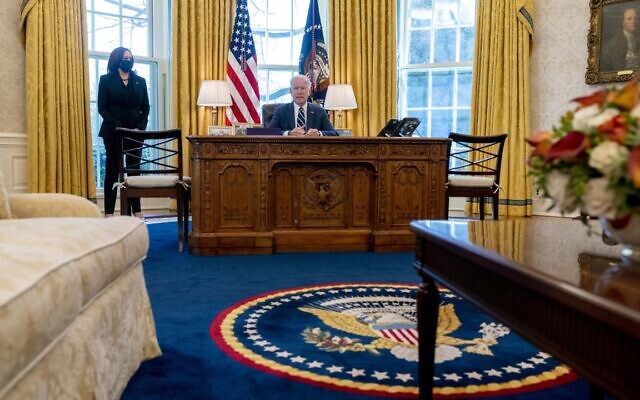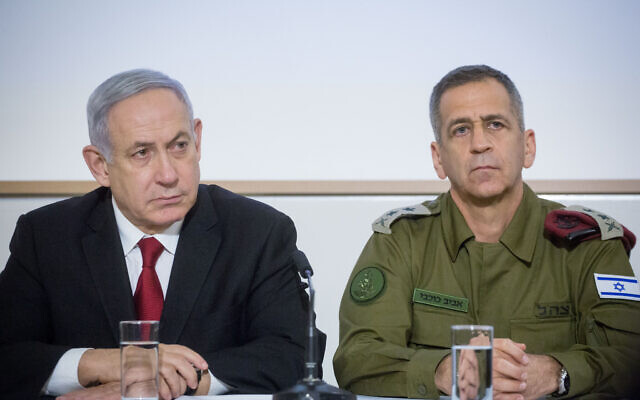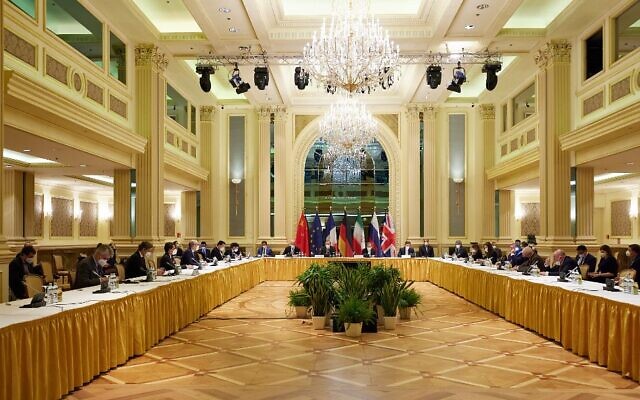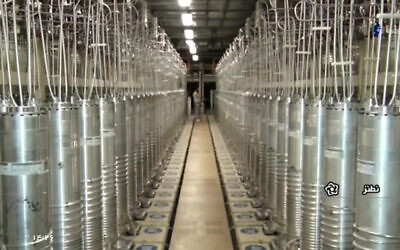Mossad chief, national security adviser head to DC Monday to lobby against US return to nuke deal; IDF chief backs out and delegation delays trip due to security flare-up

US President Joe Biden, accompanied by Vice President Kamala Harris, speaks before signing the American Rescue Plan, a coronavirus relief package, in the Oval Office of the White House, Thursday, March 11, 2021, in Washington. (AP Photo/Andrew Harnik)
Israel’s delegation to Washington DC will not change the United States position on rejoining the 2015 nuclear deal with Iran, the White House press secretary said in a briefing Friday.
On Monday, a high-level Israeli delegation will travel to Washington to voice objection to the US return to the Iran nuclear deal, but not to hold talks on the details. It will be headed by Mossad chief Yossi Cohen and National Security Adviser Meir Ben-Shabbat.
Asked whether the visit will impact the administration’s position on rejoining the deal, White House Press Secretary Jen Psaki said: “No.”
Psaki expanded on the indirect negotiations with Iran, saying that while the White House “knew they would be challenging, we’re encouraged that there are still conversations between all parties and that they’re still happening.”
“As it relates to Israel, we have kept them abreast, as a key partner of these discussions, of our intentions and we will continue to do that on any future visits,” Psaki added.
Prime Minister Benjamin Netanyahu emphasized in a meeting with the delegation last week that Israel is not a party in the nuclear agreement with Iran, and not committed to it, clarifying that “Israel is committed to its own security interests only and will act accordingly,” an Israeli official said Friday.
“The instructions to the senior security officials that are flying to Washington for talks is to present Israel’s opposition to the agreement in Iran and not to negotiate over it, because we are talking about a return to the previous agreement that is dangerous for Israel and the region,” the official said, speaking on condition of anonymity.
“If in the future there are serious contacts on Iran’s part over an improved agreement, Israel will state its position on the characteristics and content that such an agreement should have,” the official added.

FILE: Prime Minister Benjamin Netanyahu and IDF Chief of Staff Aviv Kohavi at a press conference after a security cabinet meeting following the escalation of violence in the Gaza Strip, at IDF headquarters in Tel Aviv, on November 12, 2019. (Miriam Alster/Flash90)
IDF Chief of Staff Aviv Kohavi has canceled his participation in the delegation amid a security flare-up in Jerusalem and in Gaza.
The rest of the delegation postponed the trip by a day after 36 rockets were fired at Israel Friday night from the Gaza Strip and clashes between Palestinians and Israeli security forces in Jerusalem and the West Bank escalated over the weekend.
Israel is generally concerned that the US is rushing too quickly to return to the 2015 nuclear accord, known formally as the Joint Comprehensive Plan of Action, and is ignoring the concerns of Israel and other Middle Eastern countries, notably those in the Gulf.
Israel and the US set up a strategic group, which last convened on April 13, to coordinate their efforts to prevent Iran from acquiring nuclear arms. The group is led by Biden’s National Security Adviser Jake Sullivan and his Israeli counterpart Ben-Shabbat.
Early last week, Kan news reported that Israel was lobbying the US to push for improved international oversight of Iran’s nuclear program, having concluded there will not be significant changes to the treaty but nonetheless seeking to slightly improve the terms of the pact, which is being negotiated in Vienna, with Europeans acting as intermediaries between Washington and Tehran.
Iranian President Hassan Rouhani said Tuesday that 60-70 percent of the issues had been resolved in Vienna.

In this handout provided by the EU Delegation in Vienna, representatives of the European Union, Iran and others attend the Iran nuclear talks at the Grand Hotel in the Austrian capital, April 15, 2021. (EU Delegation in Vienna via Getty Images, JTA)
Earlier this month, European powers expressed “grave concern” over Iran’s move to boost uranium enrichment to 60% in response to what Tehran says was an attack by Israel against the key nuclear facility of Natanz.
The step will bring Iran closer to the 90% purity threshold for military use and shorten its potential “breakout time” to build an atomic bomb — a goal the Islamic Republic denies.
A spokesman for the US State Department indicated that Washington was backing down from a key prerequisite for its return to the deal.
The Biden administration had repeatedly said that it would only return to the nuclear deal if Iran first returns to compliance. However, last week US State Department Spokesperson Ned Price said at a press conference that Washington would only need to be sure that Iran intended to return to compliance.
Critics of the deal have long denounced the deal’s so-called “sunset clauses,” prohibitions on certain nuclear activities that end after a certain number of years. Though the deal technically prohibits Iran from ever developing a nuclear weapon, detractors of the agreement say these clauses will allow Iran to do so with impunity once the sanctions against the regime end.

In this image made from April 17, 2021, video released by the Islamic Republic Iran Broadcasting, IRIB, state-run TV, various centrifuge machines line a hall at the Natanz Uranium Enrichment Facility, Iran. (IRIB via AP, File)
The agreement is also narrowly focused solely on the nuclear issue, ignoring Iran’s development of nuclear-capable ballistic missiles that can reach Israel and parts of Europe, as well as its constant funding and support of terror groups like Hezbollah.
Proponents of the agreement generally argue that while the deal is imperfect, it was the best possible deal that could be struck under the circumstances and at least postpones the development of an Iranian nuclear weapon.
Agencies contributed to this report.



Pulling out from Afghanistan, the war mongers need to find other areas of conflicts to keep the Defense Industry on its toes!